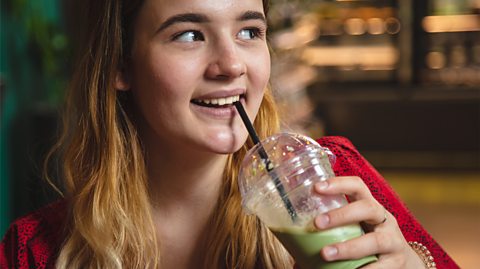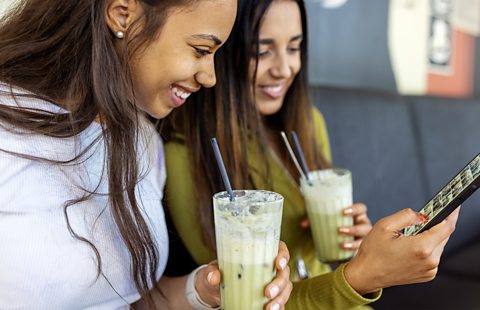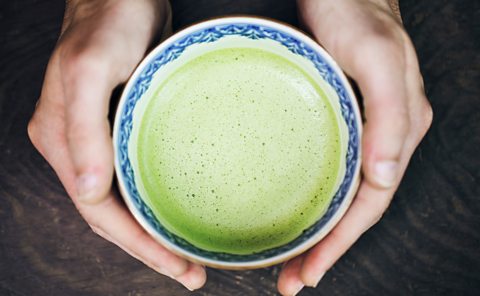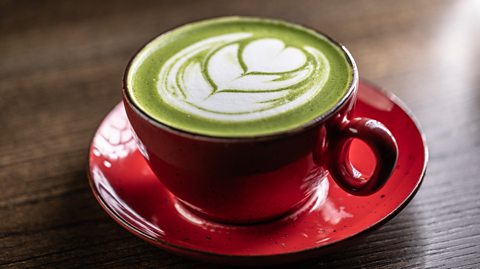What you need to know about matcha
From Dubai chocolate to the strawberry and creme sandwich, food trends are all the rage on social media at the moment.
But beyond all the others, it's matcha that seems to pull in the most consistent attention. With the hashtag "Matcha Tok" totting up tens of millions of views across TikTok.
You might've seen this bright green beverage flash across your fyp, but what actually is it? Are the rumours about health benefits true? And, most importantly, how can you make matcha of your own? Find out all this and more with this handy matcha guide from BBC Bitesize!
What is matcha?
Matcha is a bright green powder made from ground, shade-grown green tea leaves.
Traditionally used in Japanese tea ceremonies, online trends on platforms like TikTok and Instagram have expanded the field of matcha products - giving rise to the matcha iced latte and even matcha donuts!
Like other teas, matcha is cultivated from the tea plant Camellia sinensis. However, unlike other types of green tea, matcha is grown under the shade of bamboo mats. This allows the plant to develop extra chloroplasts so it can collect more light.
The additional chlorophyll is what gives matcha its signature bright green colouring and earthy taste.

Does matcha contain caffeine?
Matcha, like other forms of tea, does contain caffeine - but exactly how much depends on a number of factors.
Caffeine itself is a substance found in teas, coffees and chocolate, and acts as stimulant in the human body. Caffeine triggers activity in the central nervous system, which can help us feel more alert and energised, which is why drinks like coffee are so popular in the morning.
Matcha contains much higher levels of caffeine than other forms of green tea, generally settling out at around 19-44mg of caffeine per gram. A typical serving of matcha powder is around 2 grams, meaning in total you'll be taking in about 38-88mg of caffeine on average.
But while matcha may crank up the caffeine count higher than your standard cup of tea, you'll still usually find less caffeine in a cup of matcha than you would in a regular coffee.
Is matcha good for you?
Matcha is jam-packed with antioxidants, which are a type of substance that can have a number of positive benefits for your health. Studies show that antioxidants called catechins, found in many green teas, can help lower blood pressure as well as cholesterol levels.
Matcha also contains the L-theanine amino acid, which has been linked with improved concentration and alertness. It is worth noting, however, that as a caffeinated drink it's important matcha is consumed in moderation - as overdoing it on the caffeine can lead to issues like anxiety or insomnia.
Matcha also serves as a good way to get a little Vitamin C into your diet, which supports the normal functioning of the immune system.
Whilst some online claim that matcha can improve other facets of personal health, such as cognition and cardiovascular health, Harvard Medical School suggests that more research needs to be done to support those theories.

What does matcha taste like?
Matcha is often described as having a grassy, earthy taste - similar to other types of green tea.
In Japan, there's actually a special term to describe the taste of things like matcha, called Umami. Umami is seen as the fifth basic taste - in addition to sweet, sour, salty and bitter - and is used to describe foods with a 'pleasant, savoury taste'.
Other things that could impact this is what your matcha is mixed with. A matcha iced latte, for example, may have a sweeter flavour than traditional matcha, due to ingredients like vanilla, syrup and honey that might've been added.
How to make matcha
How do you make traditional matcha tea?
Sift 1-2 tsp of matcha powder into a tea bowl
Add hot (not boiling) water
Whisk intensely in a zig-zag motion
Do this until your drink looks nice and frothy
Enjoy!

How do you make a matcha latte?
Put your matcha and sweetener (honey, syrup etc) into a mug/bowl
Pour in one tablespoon of recently boiled water
Stir into a thick paste
Heat some milk until steaming
Froth this until foamy with a whisk
Then, pour into your matcha to create your very own matcha latte
And enjoy!
Always be careful when handling hot drinks
